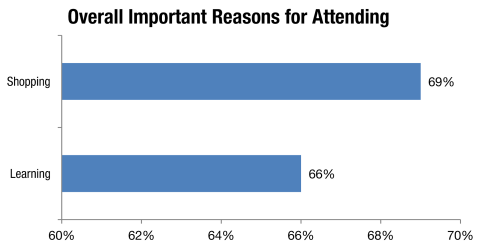CEIR Reports on "What Attendees Want from Exhibitions"

In its latest report, the Center for Exhibition Industry Research updated a study first released 10 years ago that took a look at attempting to answer the age-old question on everyone’s minds: “What Attendees Want from Exhibitions.”
The first part of the series of reports on this subject will focus on what attendees want from exhibitions and how well their needs are being met at events.
Respondents were asked to rate the importance of 22 possible reasons for attending, ranging from the seminars and speakers to finding a solution for an existing product.
Two overall reasons for attending an event were listed – Shopping Needs and Learning Needs – and the respondents indicated that both were mutually important, with 69 percent saying they attend to meet Shopping Needs and 66 percent for Learning Needs.
The results indicated many attendees have dual agendas when they go to an event and are seeking to meet both organizational and personal needs.
Respondents ranked the importance of attending on several subjects on a scale of 1 to 7, where 1 signifies ‘Very Unimportant’ and 7 signifies ‘Very Important.’
For Shopping Needs, reasons they cited for attending an event in top to bottom order included seeing new technology, ability to talk to experts, new product introduction, interact with new products and have questions answered on the spot.
Even though respondents indicated their overall Shopping Needs were being met at events, there still is room for improvement, according to the report.
These areas include: Having Attendee Questions Answered on the Spot, Finding Solutions for Existing Problems and Gathering Information for Upcoming Purchases.
The key to this is ensuring booth staff have are fully trained and are able to handle and answer the full gamut of questions to help attendees meet their needs at the event.
For Learning Needs, the top 10 important reasons overall included four Learning Needs: Insights into Industry Trends, Professional Networking, Better Job Performance and Personal Development.
Seminars and Speakers also are an important need, with an average importance greater than 5 on the 7 point scale.
Overall, respondents indicated that exhibitions are doing relatively well meeting their Learning Needs.
Typical roles defined in the buying process include the Influencer, the Specifier, the Recommender and the Decider (Castleberry, Tanner).
In this study, a new role emerged – the Scout. The Scout is someone who is sent out to gather information to bring back to others in the organization and their needs differ slightly from the more traditionally defined roles.
Scouts are more likely than others to rate a number of needs as more important such as meet actual users, see new technology, networking and personal development, to name a few.
Scouts often decide what information and products to take back to the team, so the study suggests exhibitors consider whether they are addressing the needs of these potentially vital purchase influencers.
Overall, the study found while Learning Needs were being met, Shopping Needs required a more fine-tuned approach. Here are a few suggestions:
To strengthen Idea Generation, for example, consider peer-to-peer interaction opportunities that center on topics likely to spark ideas.
Since product interaction opportunities vary in quality by industry yet are very important to attendees, exhibitors should consider from the attendee perspective whether interaction opportunities are sufficient. Less pitch, more play (with the product) may be one way to meet attendee needs more fully.
Adopting a consultative sales approach, listen first then answer, is a way to address Having Questions Answered on the Spot.
The study concluded that “delivering in-person, customized answers is a powerful way to differentiate face-to-face marketing from alternative channels. It is the best chance to make a lasting impression.”


Add new comment